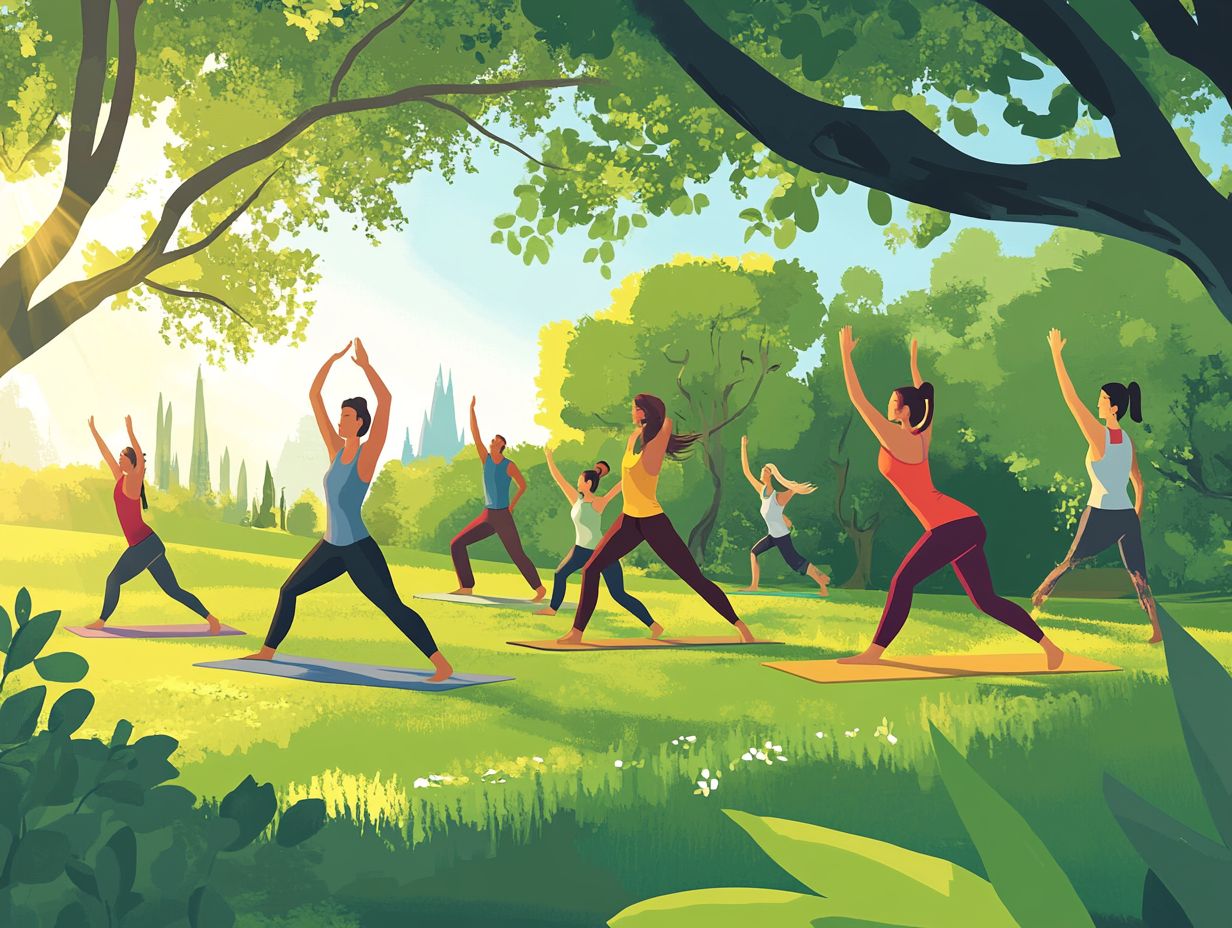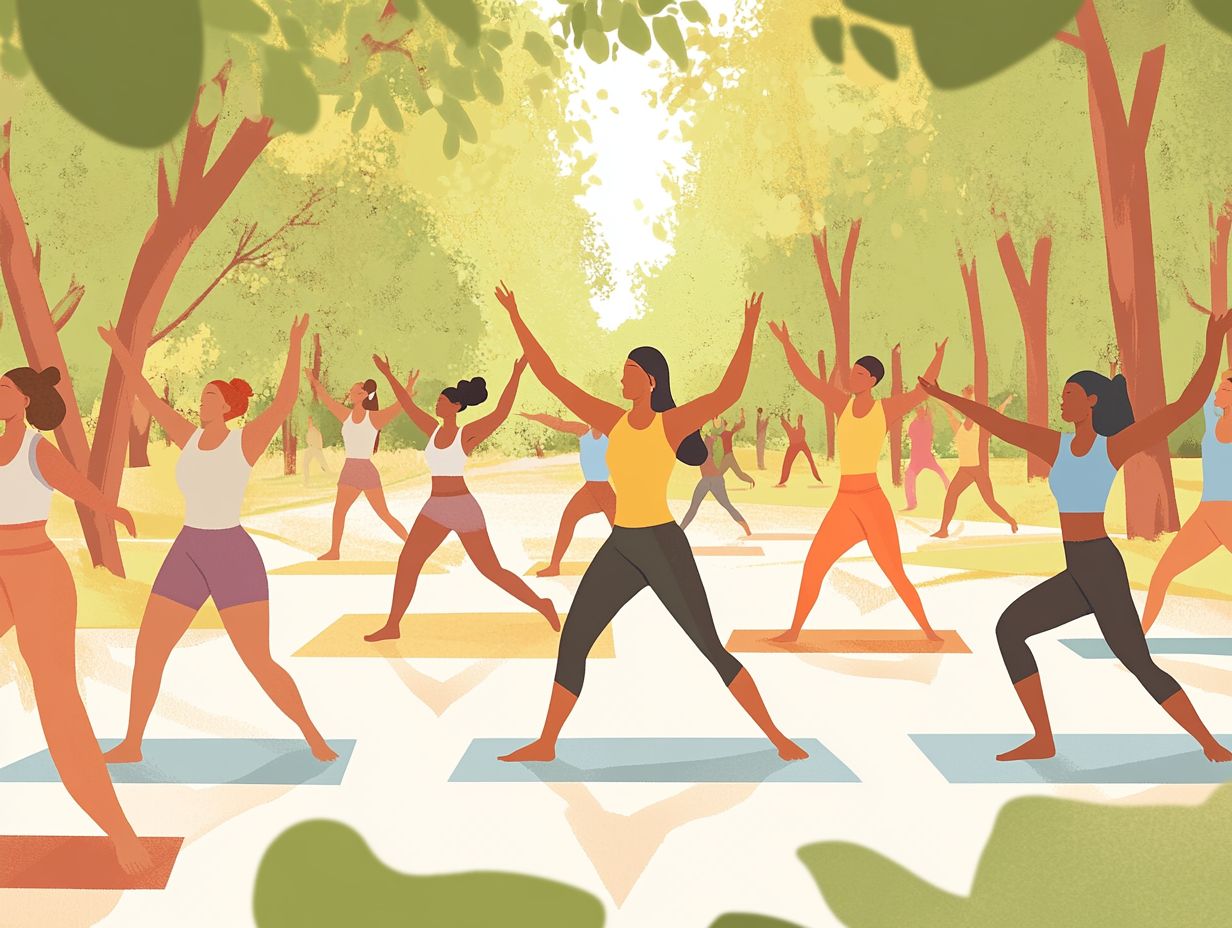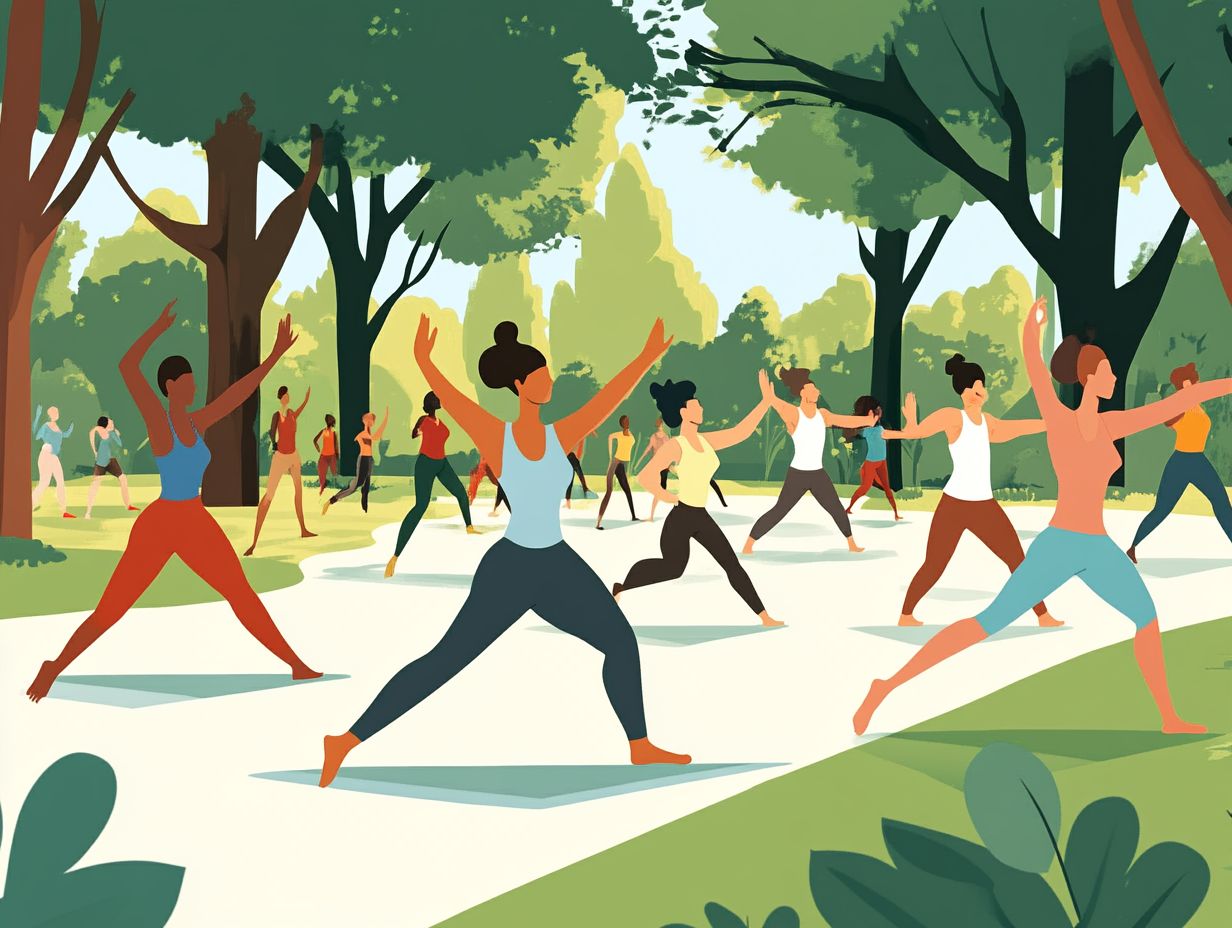The Role of Exercise in Achieving Balance
In today’s fast-paced world, achieving balance in life has become more essential than ever. This exploration delves into the true essence of balance and its significance, revealing the vital link between exercise and the maintenance of both physical and mental equilibrium.
You will discover a variety of exercises that foster balance, including aerobic activities, strength training, and mind-body practices like yoga. Helpful tips will guide you in seamlessly incorporating these activities into your daily routine, while considering the roles of nutrition and sleep.
Start your exciting journey now to achieve balance in life!
Contents
- Key Takeaways:
- Understanding Balance in Life
- The Connection Between Exercise and Balance
- Types of Exercises for Achieving Balance
- Incorporating Exercise into Daily Life
- Other Factors that Contribute to Balance
- Strategies for Maintaining Balance
- Frequently Asked Questions
- What is the role of exercise in achieving balance?
- How does exercise help us find balance in our daily lives?
- Can exercise help us achieve a work-life balance?
- How does exercise impact our mental well-being?
- What types of exercise are best for achieving balance?
- Is there a recommended amount of exercise for achieving balance?
Key Takeaways:

- Exercise is crucial in achieving balance as it impacts both physical and mental well-being.
- Incorporating a balanced exercise routine, including aerobic, strength training, and mind-body exercises, can improve overall balance.
- Maintaining a holistic approach to balance, including factors like nutrition and sleep, is key for long-term success.
Understanding Balance in Life
Understanding balance in your life is essential for achieving a fulfilling and harmonious existence. It involves finding equilibrium among various aspects, such as your personal and professional commitments, emotional well-being, and physical health.
When you manage to balance these elements, you will likely experience enhanced mental clarity and increased life satisfaction. This sets the stage for a healthier lifestyle and improved overall quality of life.
This balance isn’t merely about managing your time; it’s about crafting a sustainable approach to everyday challenges that fosters resilience, reduces stress, and nurtures your emotional health.
By recognizing the significance of maintaining this balance, you can prioritize your well-being and embark on a complete change in how you live for better health.
Defining Balance and its Importance
Balance embodies the state of equilibrium where various aspects of your life coexist harmoniously. This enables you to flourish both personally and professionally.
Achieving this equilibrium is vital for preserving your emotional and mental health. It profoundly influences how you navigate stress, relationships, and daily challenges.
When your scales tip too far in one direction whether it be work or personal commitments you may find yourself grappling with heightened anxiety, burnout, and a nagging sense of dissatisfaction.
Nurturing a healthy work-life balance not only fosters a sense of fulfillment but also elevates your overall well-being. This balance encourages productive engagement in both spheres, leading to greater contentment, improved relationships, and even enhanced immune responses.
It becomes clear that a well-rounded life is essential for thriving in today s fast-paced world.
The Connection Between Exercise and Balance
The connection between exercise and balance is truly remarkable. By engaging in regular physical activity, you are not only enhancing your core strength but also improving awareness of your body s position, which plays a crucial role in overall stability and well-being.
Exploring diverse forms of exercise can sharpen your mental clarity, elevate your emotional health, and build resilience against stress. All of these bolster your ability to maintain balance in life.
Activities like yoga, tai chi, and even group classes offer a holistic approach to fitness. They blend physical exertion with mindfulness practices that enhance your mental health.
By understanding this vital connection, you can empower yourself to weave exercise seamlessly into your daily routine. This promotes a healthier lifestyle that enriches both your physical and mental well-being.
How Exercise Impacts Physical and Mental Balance
Exercise plays a critical role in enhancing both your physical and mental balance by releasing endorphins (the body’s natural mood lifters) those delightful little chemicals that help reduce stress and elevate your mood.
Engaging in a variety of exercises, from aerobic activities like running or cycling to strength training exercises such as weightlifting, significantly boosts your overall stability and coordination. These movements strengthen your core muscles and enhance your mobility, which is essential for maintaining balance at any age.
Regular physical activity fosters a deeper connection between your mind and body, leading to increased awareness and control over your movements.
The mental health benefits of incorporating exercise into your daily routine are profound. Get ready to feel happier and more confident! You can experience improved emotional well-being, a decrease in anxiety levels, and a boost in self-esteem, all contributing to a holistic approach to health.
Types of Exercises for Achieving Balance

Achieving balance in life can be greatly enriched by integrating a diverse array of exercises that cater to both physical and mental well-being. These activities not only bolster your physical fitness but also enhance mental clarity and emotional health.
By engaging in aerobic exercises, strength training, and mind-body practices like yoga and tai chi, you can craft a comprehensive fitness routine that addresses core strength and balance. Each form of exercise contributes uniquely to cultivating a balanced lifestyle, ultimately paving the way for an improved quality of life and greater overall satisfaction.
Aerobic Exercise
Aerobic exercise is a powerful form of physical activity that elevates your heart health and overall fitness while promoting stress reduction.
Jump into jogging, biking, or swimming today for a healthier you! Engaging in activities like jogging, biking, and swimming offers you diverse pathways to enhance your physical health.
Jogging transforms into an invigorating experience as you connect with nature, fostering mindfulness while you traverse trails or parks. Alternatively, biking presents a dynamic option that boosts your stamina and allows you to explore new terrains, all while enjoying the invigorating embrace of fresh air.
Swimming elegantly combines resistance with aerobic training, benefiting both your body and mind. Each of these activities builds your endurance and serves as a fantastic outlet for stress relief.
Strength Training
Strength training is essential for building core strength, enhancing muscle activation, and improving overall body stability, all of which directly contribute to your physical balance.
Incorporating a variety of exercises that target major muscle groups think squats, deadlifts, and bench presses is crucial for developing a well-rounded physique. These movements strengthen your muscles and reinforce your body s ability to maintain proper alignment and posture, which is vital for injury prevention.
Engaging regularly in strength training creates a solid foundation, allowing you to tackle daily tasks with ease and confidence. The benefits of strength training go beyond just looking good; it plays a pivotal role in enhancing your overall physical fitness and promoting longevity.
Yoga and Mind-Body Exercises
Yoga and other mind-body exercises, such as tai chi, offer profound benefits for achieving both physical and mental balance, seamlessly integrating mindfulness into your movements.
These practices provide a holistic approach to well-being, enhancing your flexibility, strength, and coordination through gentle yet effective movements. You ll likely notice an improvement in your posture and a significant reduction in injury risks as you cultivate your balance over time.
Beyond the physical benefits, these mind-body exercises foster emotional resilience by teaching you to connect with your breath and center yourself amidst life s challenges. This promotes a calmer state of mind and alleviates stress and anxiety, nurturing a greater sense of tranquility and overall mental wellness.
Incorporating Exercise into Daily Life
Incorporating exercise into your daily life is crucial for achieving a balanced lifestyle. Developing a structured exercise routine can significantly boost your motivation and commitment to your fitness goals.
Whether you prefer outdoor activities, engaging in group classes, or enjoying home workouts, establishing a consistent daily practice can greatly enhance both your physical fitness and mental well-being.
Utilizing fitness apps can offer valuable insights and support, simplifying the process of tracking your progress and maintaining motivation. By understanding the various ways to seamlessly weave exercise into your daily routine, you empower yourself to unlock long-lasting health benefits.
Tips for Maintaining a Balanced Exercise Routine

Maintaining a balanced exercise routine requires thoughtful planning and dedication. Effective fitness tips can help keep your motivation soaring.
To achieve this, it s crucial to identify personal barriers, such as time constraints or a lack of resources, and develop strategies to navigate around them. Setting realistic goals is essential; they not only provide a framework for your progress but also foster a sense of accomplishment with every milestone you reach.
Incorporating variety into your workouts by exploring different types of exercise, changing your workout locations, or experimenting with new classes can ward off boredom and reignite your enthusiasm. By staying adaptable and cultivating a supportive environment, you can establish a sustainable exercise habit that enhances your overall well-being.
Other Factors that Contribute to Balance
Achieving balance in life goes beyond exercise. It includes important elements like nutrition, restorative sleep, and effective stress management. Each of these factors plays a crucial role in enhancing your overall well-being and fostering a harmonious work-life balance.
Unlocking the Power of Nutrition and Sleep
Nutrition and sleep form the foundation of a balanced lifestyle, profoundly impacting your emotional health and overall well-being.
A well-rounded diet brimming with fruits, vegetables, whole grains, and lean proteins can significantly elevate your mood stability and cognitive function. For instance, the omega-3 fatty acids found in fatty fish like salmon are renowned for their ability to reduce depression levels. Vitamins B6 and B12 play essential roles in supporting nerve function and boosting energy levels.
Sleep is essential for your body s restoration. By establishing a consistent sleep schedule and crafting a soothing bedtime routine, you can enhance your sleep quality. Improved sleep leads to better emotional regulation and resilience.
By prioritizing these elements, you can cultivate a healthier mindset and embrace a more vibrant life.
Strategies for Maintaining Balance
Maintaining balance in your life necessitates a thoughtful, strategic approach that emphasizes a well-rounded lifestyle. Integrating mindfulness practices and effective stress management techniques can significantly enhance your overall quality of life.
Creating a Holistic Approach to Balance
Creating a holistic approach to balance weaves together various dimensions of life physical, mental, and emotional well-being into a seamless lifestyle.
This means prioritizing regular exercise and nutritious eating, while also embracing mindfulness practices like meditation and deep breathing exercises to alleviate stress. Start your day with a quick meditation to energize your mind!
Engaging in stress management techniques such as journaling or yoga provides vital outlets for emotional release, helping you navigate daily challenges with greater resilience.
By blending these diverse practices, you cultivate a more harmonious existence, leading to improved focus at work and stronger relationships at home.
Start your journey to a balanced life today your future self will thank you!
Frequently Asked Questions

What is the role of exercise in achieving balance?
Exercise strengthens our physical, mental, and emotional well-being.
It helps maintain a healthy weight, reduce stress, and improve our quality of life.
How does exercise help us find balance in our daily lives?
Regular physical activity builds endurance and stamina, making daily tasks easier.
Feel the uplift in your mood and find a sense of equilibrium!
Can exercise help us achieve a work-life balance?
Exercise helps achieve work-life balance by reducing stress and helping you relax.
It improves focus and productivity, enabling you to manage your time better.
How does exercise impact our mental well-being?
Exercise releases chemicals in the brain that make you feel happy.
It helps manage symptoms of anxiety and depression, contributing to your overall well-being.
What types of exercise are best for achieving balance?
Any activity that raises your heart rate and challenges your muscles is beneficial.
This includes cardio like running or cycling, strength training, yoga, and even activities like walking or gardening.
Find something you enjoy and stick to it consistently!
Is there a recommended amount of exercise for achieving balance?
The World Health Organization recommends at least 150 minutes of moderate exercise or 75 minutes of vigorous exercise per week for optimal health benefits.
However, any amount of activity contributes to balance. Start your journey to balance now!






